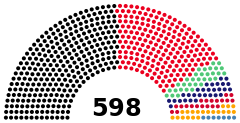Reichstag
| German Imperial Diet Deutscher Reichstag | |
|---|---|
 Official Seal | |
| History | |
| Founded | 1871 |
| Leadership | |
President of the Reichstag | |
Vice President of the Reichstag | |
Leader of the Opposition | |
| Structure | |
| Seats | 598 |
 | |
Political groups |
Government (291)
Confidence and Supply (9)
Opposition (195)
Other opposition
|
| Elections | |
| Mixed-member proportional representation | |
Last election | 3 October 2021 |
Next election | 2025 |
| Meeting place | |
 | |
| Reichstag building | |
The Reichstag ("Imperial Diet") is the lower house of the Parliament of Germany, the national legislature of the German Empire. The Reichstag was established in 1871 through the Constitution of the German Empire, but its powers and role in the federal government heavily modified in 1975. Members of the Reichstag meet in the Reichstag building in Berlin, the national capital of the German Empire.
The Reichstag is composed of 598 members, who are elected by the German people through a mixed-member proportional representation system which combines a mix of first-past-the-post with a proportional party list that reflects the national popular vote. Members are referred to as "Member of the Reichstag" and are elected to serve a term of four years. Although possible, early elections are extremely rare and are somewhat discourage by the Constitution.
The Reichstag is viewed as the more powerful house of Parliament when compared to the Bundesrat. The Chancellor of Germany, their cabinet, the Leader of the Opposition, and other important government and political officials all originate in the Reichstag. Along with that, the Reichstag is the only chamber of the German Parliament that is directly elected by the German people, with the Bundesrat being composed of a mix members appointed by each federal state's monarch or legislature. Due to this, the Reichstag has considerably more power than the Bundesrat.
History
Reichstag translates as "Imperial Diet", with "Bund" (cognate to English "bundle") and "stag" (stay) came to mean "meeting in conference".
The Reichstag was established in 1871 following the formation of the German Empire as the successor state to the North German Confederation and was established in Berlin, then the capital of the current German state of Prussia, the largest and most influencial state in all of Germany today. Two decades later, the current parliament building would be errected and delegates would be elected in direct elections with universal male suffrage instead of the three-class electoral system in Prussia used until 1918. The Reichstag did not participate in the appointment of the Chancellor until October 1918 when parliamentary reforms were implemented. In response to the German Revolution of 1918–1919, women were granted suffrage and were given the ability to vote for and serve in the Reichstag. Parliament would also be given new powers to pass a vote of no confidence and force the resgination of either the chancellor or members of the cabinet.